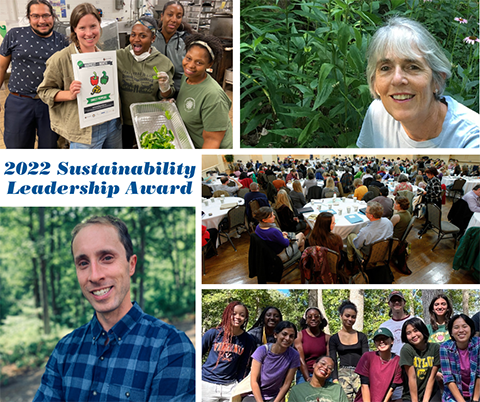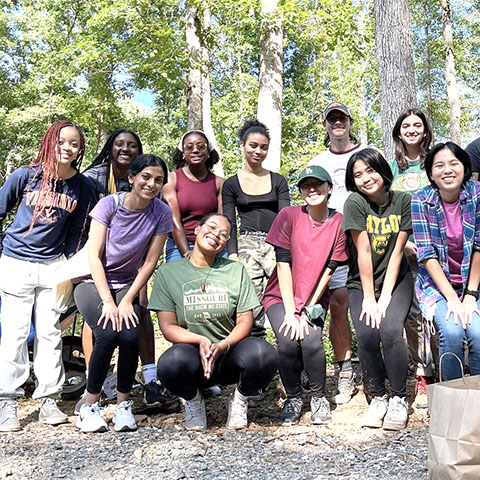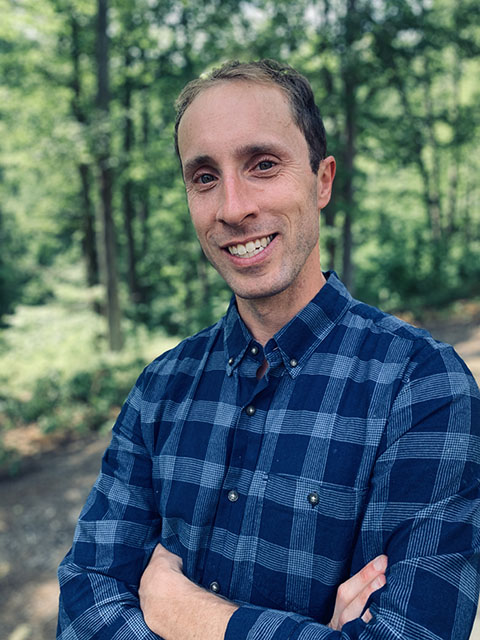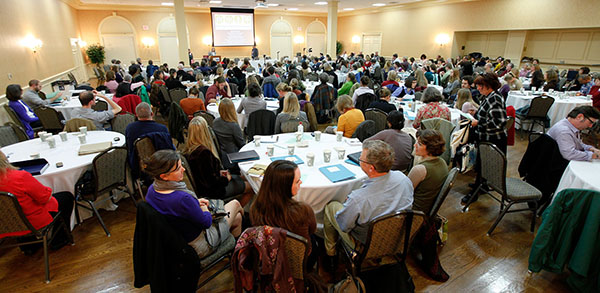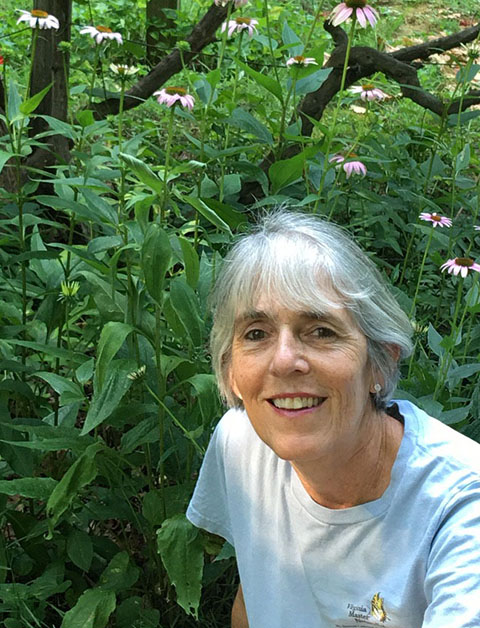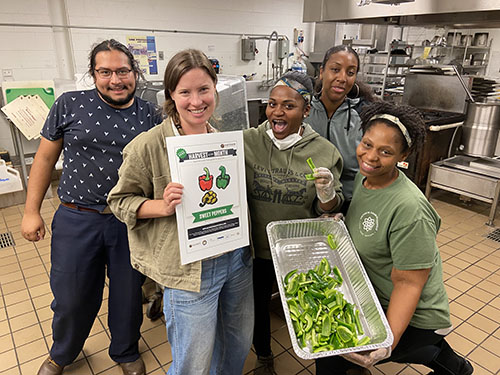Sustainability Leadership Award Winners for 2022
The award is arranged and administered by the Civic Engagement Subcommittee of the University’s Committee on Sustainability. Recipients run the gamut from UVA staff, faculty and students, academic and administrative units, and Charlottesville citizens and organizations. Each winner or winning entity will receive $1,000 and all will be recognized at a celebration later this spring.
The winners are:
- Student(s): Environmental Justice Collective
- Faculty: Matthew Meyer, M.D., Assistant Professor of Anesthesiology, School of Medicine, and UVA Health Anesthesiologist
- Staff: Institute for Engagement & Negotiation
- Community member(s): Christine Hirsh-Putnam (retired teacher and community volunteer) and Cultivate Charlottesville
“We are so grateful to all those who submitted nominations – it was amazing to learn about all of the creative and positive work being done to move our collective needle, furthering sustainability on Grounds and across the broader community,” said Christie Julien, co-chair of the subcommittee and Assistant Dean for Diversity, Equity, and Inclusion at the Darden School of Business.
Criteria for winners included demonstrating innovation and passion in work related to civic engagement, stewardship of the built and natural environment, discovery through teaching or research, and/or sound governance practices and collaboration. With an extremely competitive field, the selection team decided to select two winners in the community category.
“The variety of ways individuals and organizations are harnessing their unique strengths and applying simple yet sophisticated strategies to solve our collective energy, waste and equity challenges was inspiring to see,” said Erika Herz, subcommittee co-chair and Strategic Planning Specialist with the Office for Sustainability.
UVA Sustainability will host a celebration this spring to bring together this year’s winners and nominees, as well as past award winners, and members of the UVA community and the public to foster connections and collaborations among those who are advancing sustainability in our shared community.
For more information about the award and nomination process, see here.
CONGRATULATIONS!
Meet the winners and hear about their leadership efforts and impacts that are helping make our world more sustainable for all.
- UVA STUDENT(S): Environmental Justice Collective
-
The Environmental Justice Collective was founded in the summer of 2020 as a space for Black, Indigenous, People of Color (BIPOC) students and community members to engage in principled direct action, community building, and mutual education for the purpose of working towards achieving environmental justice. EJC was created by a group of BIPOC women who saw a need for an organization that focused on the particular relationships of BIPOC communities to our natural and built environments and provided a safe space for students of color to engage with environmental issues.
EJC's work over the past two and a half years reflects a sustained commitment to actualizing a vision for a more sustainable future. The group's vision revolves around achieving environmental justice by addressing the connections between legacies of colonialism, capitalism, and racism and contemporary local and global environmental crises while also recalibrating our relationships to land and the environment.
While EJC predominantly organizes events specifically for UVA students, the group has also made a concerted effort to attend events organized by Charlottesville/Albemarle community members and maintain connections with the broader community beyond UVA. Past events EJC organized have ranged from workdays at local community gardens to collaborative teach-ins on current events.
Other events conducted over the past two and a half years include the following:
- Teach-in with Muslims United and the Pakistani Student Association on the catastrophic 2022 floods in Pakistan, contextualized in relation to legacies of colonialism
- Earth Day 2021 panel: “Pathways Toward Environmental Justice and Nourishing Infrastructures,” featuring Queen Zakia Shabazz and Beth Roach (partially sponsored by the Equity & Environment Fund)
- Letter writing session to participants in the Solitary Gardens project, a national collaborative art project through which incarcerated folks design a garden bed with the dimensions of a solitary confinement cell
- Foraging excursions guided by BIPOC community members as an opportunity to better understand our plant relatives.
Since its founding, EJC has endeavored to shift conversations around environmental justice away from band-aid technological solutions that fail to address the root causes of climate change and environmental injustices. Additionally, the collective has emphasized intersectionality as a central framework for understanding the complexities of environmental justice. Even when engaging in mutual aid by fundraising to benefit organizations such as those working on the ground to address the water crisis in Jackson, Mississippi, in September 2022, or to help queer youth in New Orleans impacted by Hurricane Ida in September 2021, EJC highlighted how these instances of climate disaster are linked to historical inequities and how the selective abandonment of certain communities amidst crises is linked to environmental racism.
In the future, EJC hopes to continue to facilitate a supportive space for UVA students to envision a more sustainable future grounded in an understanding of mutual respect for and responsibility to land and the communities we inhabit.
- UVA FACULTY: Dr. Matthew Meyer
-
Dr. Matthew Meyer is Assistant Professor of Anesthesiology in the School of Medicine and a UVA Health Anesthesiologist. His commitment to advancing sustainability in health care is evident in his teaching, research, clinical activities and community service. In 2021, Dr. Meyer became co-chair of the UVA Health Sustainability Committee, a collaborative group of passionate employees engaged in waste- and energy-reduction projects. He started UVA Health’s Greening the OR Working Group, lectures regularly on healthcare decarbonization, is an active member of the Virginia Clinicians for Climate Action steering committee, and studies and operationalizes perioperative practices that improve efficiency and eliminate waste.
In his 3+ years of involvement with this group, his contributions have been invaluable, as he:
- Helped improve communications with sustainability-interested clinicians to grow this movement
- Presented to numerous departments about the role clinicians can play in sustainability, both at work and beyond
- Initiated strategic planning conversations with top-level leaders including very robust recommendations for sustainability
- Made the case for UVA Health to join Practice Greenhealth, an organization that provides resources and best-practices to its healthcare partners
- Advocated for the creation of a UVA Health Sustainability Center, which set high aspirations for the type of sustainability initiatives we might strive for.
Dr. Meyer continues to share learning opportunities like webinars and articles through relevant networks so we can all stay informed on cutting-edge practices. Over the years, he has engaged in many other sustainability-related efforts:
- Steering committee member of Virginia Clinicians for Climate Action, a group that “educates and mobilizes clinician leaders to bring the health voice to climate policymaking in Virginia”
- Writer of op-eds, including a 2021 contribution making the case that addressing unsustainable operations of hospitals falls within health care workers' mandate to “do no harm”
- Author of scientific research articles on the relative environmental costs and sustainability of various anesthetics
- Champion for the implementation of a switch from high GHG-potential anesthesia gasses to low potential ones at UVA Health (as identified as a best practice in his publication)
- Guest instructor in conferences like the School of Nursing’s “Protecting Human Health in a Changing Climate” Conference, UVA courses like the “Climate and Health” elective for UVA Medical students, and even community events like the City/County panel on projected climate impacts in our community.
And finally, as if his free time weren’t already filled with these other commitments and activities, Dr. Meyer has co-founded a startup company with a former student collaborator called Periop Green, whose goal is to develop technology to reduce operating room waste to as little as possible. Dr. Meyer is doing all he can to made a difference in our world and in our community.
- UVA STAFF: Institute for Engagement & Negotiation
-
A nationally recognized leader in designing and facilitating collaborative governance, IEN is a public service organization of UVA. The team assists organizations, agencies, industry, and communities in making bold, sustainable decisions across a broad range of environmental, social, and economic issues through different forms of collaborative governance. IEN's collaborative governance processes lead to more creative and effective shared solutions to public issues and our emphasis on equitable and inclusive processes yields greater understanding and builds critical legitimacy for solutions. IEN has a long history of fostering collaboration and collaborative governance for sustainability – at UVA, within Virginia communities, and nationally.
To foster sustainable governance and collaboration, IEN has led and facilitated the following projects:
- In 2010, IEN’s Tanya Denckla Cobb co-founded the UVA Food Collaborative which evolved in 2015 into the unique UVA Sustainable Food Collaborative. Since then, IEN has provided leadership and coordination for the collaborative and stewarded the development and ongoing adaptation of the its governance structure to meet its evolving needs through the development of the 10-year Sustainable Food Action Plan and into its implementation.
- IEN co-founded in 2015 a unique multidisciplinary partnership, the Resilience Adaptation Feasibility Tool, or RAFT, to foster a collaborative decision-making and governance approach to climate resilience that leverages the expertise and resources of partners and diverse community stakeholders to support coastal localities striving to increase their resilience. In 2020, a shift in The RAFT’s assessment approach, introduced by IEN, has led to an increased role for and recognition of the importance of social equity in local climate resilience priorities. The RAFT collaborative governance structure – implementation teams for each locality – now include numerous community nonprofit service organizations that serve at-risk and underserved populations, ensuring that climate equity issues are an integral aspect of the community’s climate resilience priorities.
- IEN developed a new framework for collaborative governance – Equitable Collaboration – along with a toolkit that lays out the following six principles for ensuring that collaboration processes are equitable in design and implementation: trauma-informed, responsive, inclusive, truth-seeking, adaptive, and deliberative. The framework was developed with a national advisory committee, and feedback from colleagues at three different professional conferences. The Governor’s Summit for Equitable Collaboration in 2021 was designed explicitly to launch IEN’s new framework, and over 1100 people registered and 875 participated from various local, state and federal organizations.
- IEN co-founded, co-teaches, and coordinates the Virginia Natural Resources Leadership Institute, which equips emerging leaders with conflict resolution and collaborative problem-solving skills, and values grounded in environmental justice, all essential for designing and leading equitable collaborative governance approaches to natural resources and sustainability issues.
- IEN led the community engagement for the design of the UVA Memorial to Enslaved Laborers, ensuring that the descendants of UVA’s enslaved laborers voices were centered in the collaborative design process, reflecting a reparative ethic and sensibility, and affirming UVA’s role as a leader in the national conversation about race, history, and institutions.
- COMMUNITY MEMBER(S): Christine Hirsh-Putnam and Cultivate Charlottesville
-
The Selection Committee selected both Ms. Hirsh-Putnam and Cultivate Charlottesville in this category. Each will receive a $1,000 prize.
Christine Hirsh-Putnam
Since retiring in spring 2020 after a 20-year career teaching science at Tandem Friends School, Christine embarked on a journey of voracious volunteerism and leadership in Albemarle County. As one colleague put it, Christine is a “Super Citizen.” She co-chairs the County’s Solid Waste Alternatives Advisory Committee (SWAAC) and leads its Outreach Subcommittee. In this capacity, Christine can be found at the McIntire Recycling Center or at the farmers market, where – like a true teacher – she will offer a practical guide for remembering which plastic film is indeed recyclable (can you stretch it with your thumb?). Or she can be found leading a raucous round of “Recycling Relay” with 30 Greer Elementary School children as part of a litter pickup day on their campus.
In the young and the old, Christine is a subtle genius at inspiring sustainable habits. To recognize her leadership of SWAAC and her past work instituting a composting program with students at Tandem, the Community Climate Collaborative recognized her in July 2021 as a “Climate Leader.”
Another example that highlights Christine’s positive leadership and innovation is the creation of the Albemarle County Environmental Stewardship Hub. As chair of the County’s Natural Heritage Committee (NHC) and its Education Work Group, Christine saw the need to empower community members by connecting them with information and resources to answer the question ‘what can I do?’ With Christine’s seed of an idea, as well as tremendous effort and input on her part, county staff built the hub, providing residents with the tools and resources to implement better stewardship practices, at home, on their land, and in their community.
During Christine’s tenure, the NHC has also advocated for county properties to be managed in more sustainable ways. For example, Christine and other NHC members have worked with staff to establish “no-mow” zones that increase biodiversity and reduce fuel use. This method of Conservation Mowing has been used at Darden Towe Park, Walnut Creek Park, and several stormwater management and wetland restoration sites throughout Albemarle. And to ensure that these seeds of sustainability continue to spread, the NHC has displayed Conservation Mowing literature and signage (English/Spanish) in multiple county parks.
In Albemarle County, Christine not only sows the seeds of inspiration as a leader of these committees, but also waters them day after day with her time and energy. She leads meetings, but also puts up flyers, digs dirt, pulls weeds, writes content, organizes events and projects, picks up trash, and teaches us -- all with a smile on her face.
Cultivate Charlottesville
A guiding principle at Cultivate Charlottesville is that food is a human right. With over 12 years sharing community work in Charlottesville, Cultivate’s anti-racist, multi-generational, multi-lingual and multi-racial staff and board work in partnership with community to realize a sustainable, healthy and just food system in Charlottesville.
Cultivate does this at the individual level though City Schoolyard Garden where the group engages youth in gardens in eight of Charlottesville’s public schools, and at the community level through the Urban Agriculture Collective’s urban farm, where thousands of pounds of food are grown and shared with hundreds of local families, at no cost to them.
Finally, Cultivate works at the systems and structures level through the advocacy work of the Food Justice Network. The project reflects the Good Neighbor initiative of UVA’s 2030 Sustainability Plan in that it is a coalition of 35+ local organizations working within and around the food system. FJN strives to be a good neighbor by connecting with community at the relationship level and amplifying community voices and choices. Along with partners and residents, FJN works and/or supports the development of strategies around food, housing and climate initiatives.
Cultivate Charlottesville combines innovation with respect for community and supporting resident led leadership. An example of this is the Food Equity Initiative Policy Platform. FJN held dialogues with residents to develop a 6-plank platform which include Food Equity and Justice, The Power to Grow, The Right to Good Food, Inspire Youth Choice, Build Community Wealth, and Restore Earth & Climate Justice.
FJN also brought the U.S. Environmental Protection Agency's workshop, "Local Foods, Local Places" to Charlottesville. The workshop, which brought together local residents, partner organizations, and EPA personnel, was designed to help communities revitalize and build sustainability for future action using local food systems. This two-day event included garden tours and discussion and strategy sessions.
In response to a growing emergency food crisis during COVID, FJN collaborated with the City of Charlottesville to develop an innovative 24/7 Food Security Text Line in English and Spanish. Residents could use the service to get information on food resources at any time of the day. This project was supported by the City’s Food Equity Initiative, FJN partners, community members, UVA's Equity & Environment Fund, and the Charlottesville Department of Human Services.
Cultivate has engaged with the University in different ways over the years. A short list includes working with three UVA Environmental Equity Fellows, joining the UVA Sustainable Food Task Force, hosting two Presidential Precinct cohorts in community farm plots, and presenting to Professor Paul Freedman’s Politics of Food class annually.
FJN is a program forged in the belief that there is power in the people and their collective action. FJN moves in community with respect and with a sense of commitment and partnership. Long-term systems change that creates real opportunity for people is the goal.

